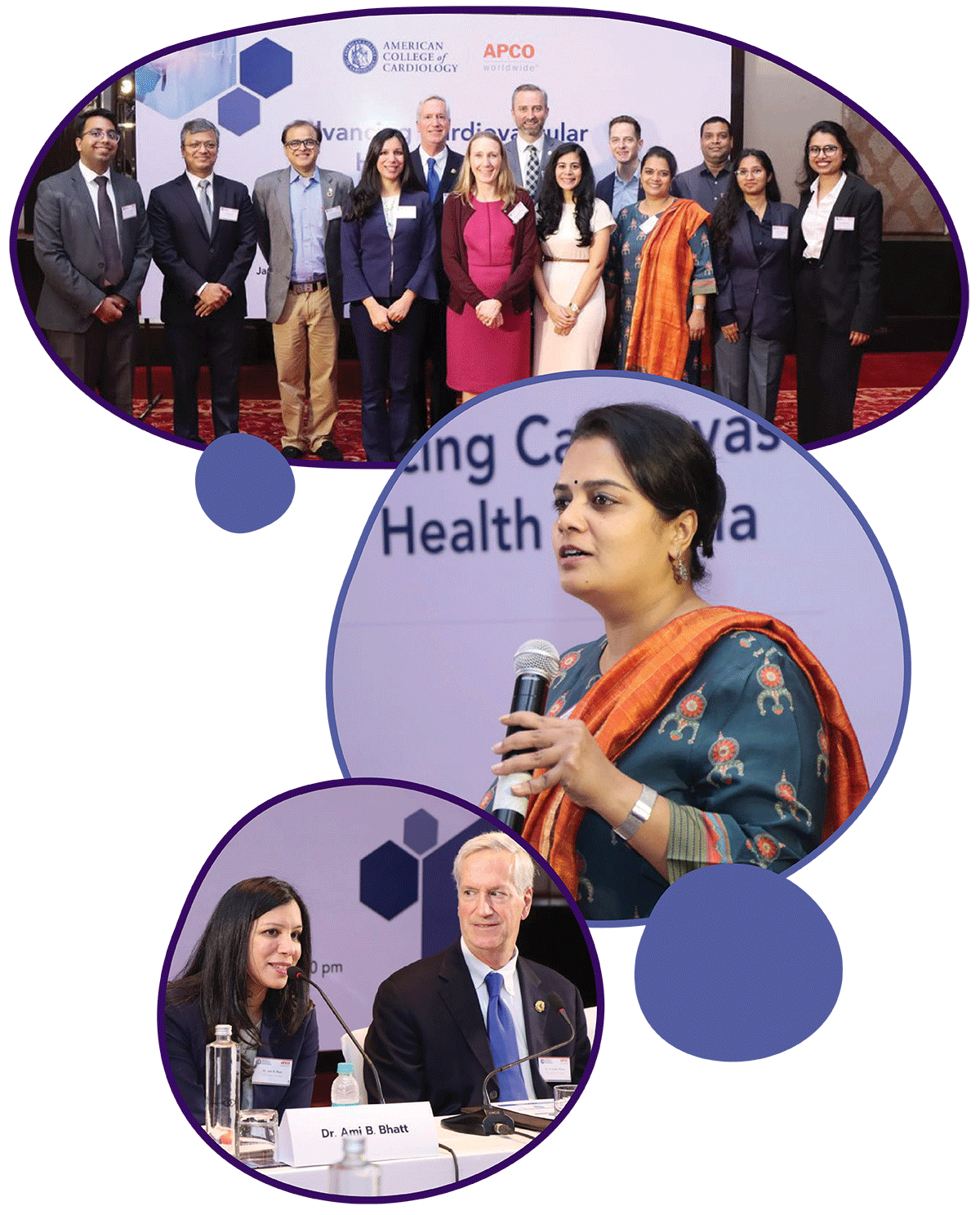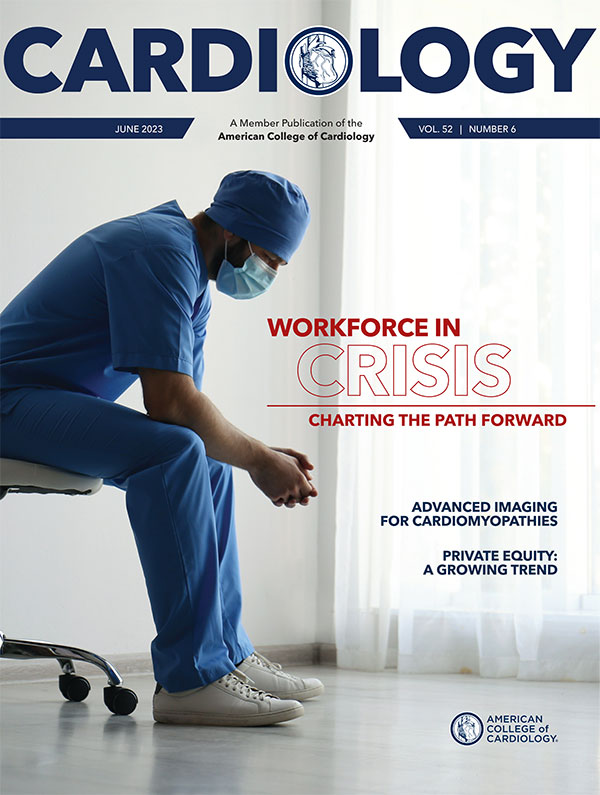The Pulse of ACC
Advancing Cardiovascular Health in India Roundtable

Given the size of both the country and the population, and the fact that roughly 10% of the population lives below the international poverty line, it's not surprising that the burden of noncommunicable diseases (NCDs), including cardiovascular diseases, is high in India. In fact, mortality from NCDs accounted for 65% of total deaths in India in 2019, of which more than 25% could be attributed to cardiovascular diseases and related risk factors like diabetes.
More recently, updated findings from the Global Burden of Diseases Collaboration, published in the Journal of the American College of Cardiology, showed age-standardized mortality rates from cardiovascular diseases in South Asia, including India, on the rise and ranging from 248.6 to 350.9 per 100,000-persons in 2021. Among all risks for cardiovascular diseases, high systolic blood pressure accounted for the largest proportion of disability-adjusted life years, while air pollution and dietary risks were the leading environmental and behavioral risks, respectively.
These challenges led the ACC to convene a roundtable earlier this year made up of leading cardiovascular clinicians from the ACC and the ACC India Chapter, as well as stakeholders from local nonprofits, government agencies and industry related to cardiovascular disease in India. The goal: to identify potential collaborative solutions to some of the specific cardiovascular challenges in India, ranging from patient access to prevention and screening services and chronic disease management.
"There is an urgency to manage the burden of cardiovascular disease in India," says ACC President B. Hadley Wilson, MD, FACC. "We need to realize the urgency of this public health crisis and develop a roadmap that will allow us to manage the multiple challenges effectively."
Roundtable participants highlighted the lack of awareness and education around cardiovascular disease and related risk factors as one of the biggest challenges facing the health care community when it comes to tackling these trends. Discussions centered around potential solutions involving increased accessed to screening and public health campaigns among others. Additionally, participants stressed that new innovations ranging from telemedicine to digital devices that allow for remote monitoring and screening are potential game-changers for managing cardiovascular disease and improving heart health throughout the country.
Don't Miss Out: Leadership Award Opportunities Available Now
The ACC is now accepting applications through Aug. 14 for both the Hani Najm Global Scholar Award and the new William A. Zoghbi International Research Award. In addition, the deadline for the prestigious ACC/ABC Merck Research Fellowship Award has been extended through June 12.
The Hani Najm Global Scholar Award, which was established under the umbrella of the College's 2020 Campaign for the Future, aims to encourage the sharing of knowledge between international cardiology professionals to better combat the devastating effects of cardiovascular disease worldwide. The award provides early career cardiologists residing in the Middle East and Africa the opportunity to grow their clinical knowledge in a particular specialty as well as facilitate knowledge exchange through an Observership Program in the U.S. and participation in the ACC Annual Scientific Session.
The William A. Zoghbi International Research Award is designed to provide a springboard for innovative new research in countries outside of the U.S. that hold potential to improve the care and outcomes of patients living with cardiovascular disease. The inaugural award of $25,000 will be given to support one year of international research across the spectrum of cardiovascular care and recognized at ACC.24 in Atlanta.
"Both of these awards were made possible thanks to the generous gifts of ACC Trustee Hani Najm, MD, FACC, and Past President William A. Zoghbi, MD, MACC, underscoring the importance of philanthropic giving in helping to achieve the College's Mission and Vision," said John Gordon Harold, MD, MACC, who also served as chair of the Campaign for the Future. "These are two of the most recent examples of ACC leaders and members giving back to the global ACC community and we remain forever grateful for their commitment and passion to fostering the next generation of clinicians, leaders, scientists and more."
Click here to learn more about the two global awards, as well as the ACC/ABC Merck Research Fellowship Award. Visit ACC.org/AnnualReport for more on ACC's philanthropic efforts, a complete list of 2022 donors, and to learn more about how you can give back.
Ukraine Hospital Improving Emergency CV Care During National Crisis
The Clinical Hospital of Emergency Services, a municipal hospital serving the community of Dnipro, in Ukraine, is the first in the country to take part in the ACC's Global Quality Solutions program. The hospital joins the program in an effort to improve heart attack care by reducing heart attack-related deaths and saving lives in their community.
"When the war started, myself and others on my team decided to stay at work to do our best to help our people, soldiers, neighbors and relatives to survive. But we decided it was not enough to only maintain, but that we must develop and raise our skills and quality of care," says Anastasiya Skoromna, MD, PhD, head of the Interventional Diagnostics and Percutaneous Treatment Department. "Because, when the war ends, Ukraine will have a great need for the recovery of its systems and infrastructure. If we are ready, it will be an easier and faster recovery."
As part of the Global Quality Solutions program, the Clinical Hospital of Emergency Services will have access to data collection, analysis and reporting frameworks that leverage ACC's NCDR CathPCI Registry data set and health care data management resources. According to the NCD Alliance, cardiovascular diseases account for 64% of all deaths from noncommunicable diseases in Ukraine. This trend is compounded by the continued humanitarian crisis, which has displaced more than 12 million individuals, of whom 2.63 million have cardiovascular disease.
"Ensuring access to essential cardiovascular care is more important than ever in Ukraine," says ACC Immediate Past President Edward T.A. Fry, MD, MACC. "The Clinical Hospital of Emergency Services' commitment to optimizing care and outcomes of patients with heart disease or related risk factors in the midst of unprecedented and unimaginable challenges – including a constant lack of supplies from basic syringes to interventional catheters and assist devices – is commendable, heroic and inspirational. It is truly an honor and privilege to support the hospital staff and clinicians in their quest to continue to transform cardiovascular care and improve heart health during this time."
Skoromna's team is made up of four interventional cardiologists ranging from newly practicing to longtime practitioners who are passionate about the work. The department opened at the end of 2021, shortly before the war began, making it even more difficult to start an interventional cardiology department where there hadn't been one previously.
"Our hope is that by participating in the Global Quality Solutions program we will better be able to see the gaps in our care, so we can learn how to deal with them and tune the health care system to work better," Skoromna says.
The Clinical Hospital of Emergency Services joins a growing list of hospitals around the world, including in South Africa, Brazil and Saudi Arabia, who are taking part in the Global Quality Solutions program and have a shared commitment to leveraging data and innovative technologies to proactively address the burden of cardiovascular disease within their own countries, as well as the rest of the world. Learn more about the program at ACC.org/GlobalHub.
ACC BOT Approves Enterprise-Wide Conflict of Interest Policy
The ACC Board of Trustees (BOT) has approved a comprehensive Conflict of Interest Policy requiring disclosure of material interests by the College's officers, trustees, member leaders and employees who have oversight and/or implementation responsibilities where a conflict of interest may arise or be perceived.
This policy acknowledges that financial relationships are essential for advancing scientific frontiers and enabling commercial development for the benefit of the public, while also acknowledging that some arrangements may appear to inappropriately impact the scientific independence and decision-making of the College or individuals. The policy empowers the College to engage in mission critical activities while avoiding and mitigating the perception of conflicting activities.
"The College is accountable to its members for responsible and proper use of its resources," says ACC President B. Hadley Wilson, MD, FACC. "All of the College leaders and employees have a duty to act in the best interests of the College's Mission. The new policy underscores the importance of taking conflicts of interest very seriously since they can damage the College's reputation and expose both the College and affiliated individuals to legal liability if not handled appropriately. Even the appearance of a conflict of interest should be avoided, as it could undermine the College's Mission and Values."
Click here to access the complete policy. Specific questions should be directed to compliance@acc.org.
Keeping POCUS in Focus
The ACC has released a new POCUS workbook providing pragmatic guidance and best practices for using point of care ultrasound (POCUS) in cardiovascular clinical practice.
The workbook highlights the advantages and barriers of POCUS, which has shown promise as a valuable tool for quick and efficient bedside assessment for several cardiovascular conditions but remains underutilized in mainstream clinical practice. It looks at POCUS use spanning various clinical settings including inpatient units, emergency departments, intensive care units, outpatient visits, long-term care facilities and virtual care and highlights appropriate triage of cardiovascular patients.
Additionally, the workbook provides guidance on when and how to use POCUS for initial cardiac screening, as well as for volume and/or vascular assessments. It also addresses the potential of artificial intelligence to further enhance the quality of image acquisition and interpretation, remote learning and guidance, web-based operations, and other technology. Download the workbook at ACC.org/POCUS.
Clinical Topics: Cardiovascular Care Team
Keywords: ACC Publications, Cardiology Magazine, ACC International, Noncommunicable Diseases, Cardiovascular Diseases, Cardiologists, Heart Diseases, Risk Factors, Cardiology, Registries, Global Burden of Disease, Government Agencies, Telemedicine, Poverty, Disease Management, Inpatients, Fellowships and Scholarships, Outpatients
< Back to Listings

